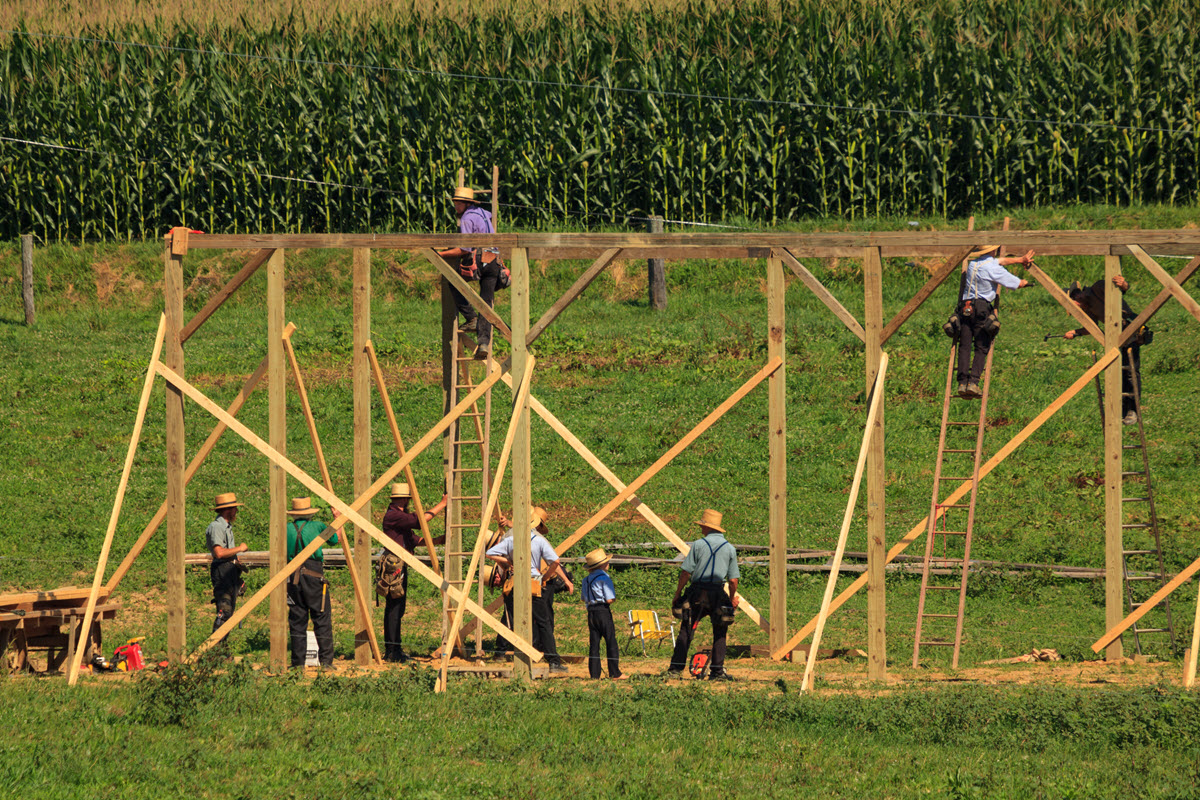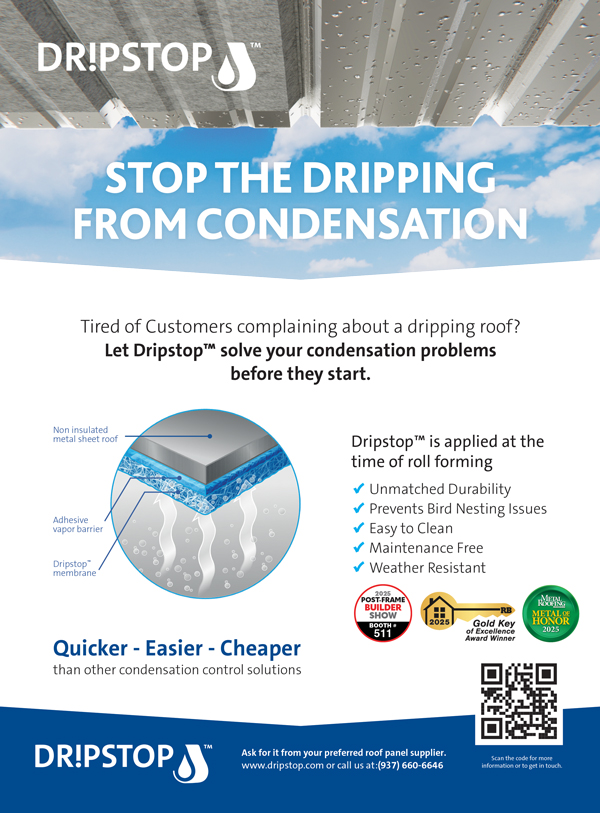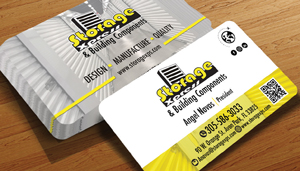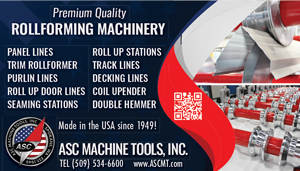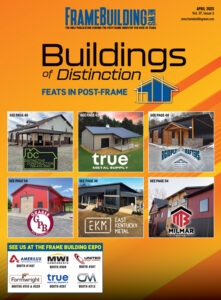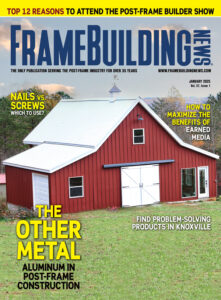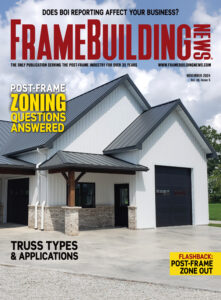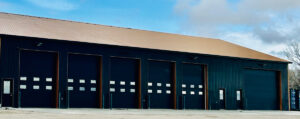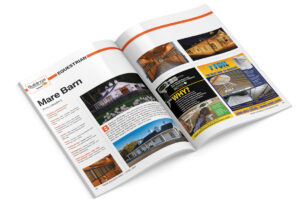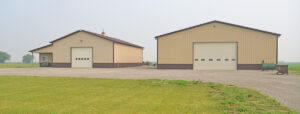Amish, Mennonite Business Owners Offer Their Advice
Plain community builders supply a significant percentage of the smaller residential and shed construction in the United States, especially in certain regions, and their percentage of that business is increasing as their families continue to hand down the building tradition, which is not true among the general population.
Therefore, a significant percentage of the readers of the Shield Wall Media magazines, including Frame Building News, and the attendees of our construction trade shows come from a “plain community,” an unofficial term we’re using to summarize both Amish and Mennonite people.
We thought it would be good to ask them for their advice to non-plain community businesspeople. What do they repeatedly have to explain to non-plain community businesses, either as buyers or sellers?
Don’t Be Shy
First and foremost, Wayne Troyer of roll forming machine company Acu-Form told us, if you’re not a plain community person and you’re not sure what to say or how to act around them, ask.
Be respectful — their language isn’t as colorful or bold as non-plain community folks — but ask them, don’t just beat around the bush. “That’s the main thing — people are not offended if you ask them, ‘So, what can you have, or what are you allowed to have?’” Troyer said.
There’s a sidebar to this article with tips about how to communicate with plain community people, but in general, do not swear, and remember they don’t drink alcohol. Also remember that most of them aren’t keen about being photographed.
Most of the other “things to know” relate to their lack of communication technology.
Communication Methods
The biggest challenge for online-enabled business owners who want to work with plain community businesses is the latter’s lack of typical digital communication methods like websites and email addresses, and depending on how conservative the community, they may not have their own phones, either.
Troyer said the mail is still a great way to reach plain community people. Remember the mail? You can put paper and/or pictures into a paper envelope and put a “stamp” on it to pay for its delivery! It’s a fascinating thing; look it up. Plain community people don’t have TV or internet; their mail is important to them, and they love receiving mail and pictures, and for the record, magazines, too.
Similarly, if you can manage to deliver products personally, have a truck make the rounds at plain communities (like the milkman used to) and it could be very worthwhile. “Take it to them,” Troyer said, whatever “it” is. And be prepared to receive cash because that will likely be how you’ll get paid.
Their Marketing Person
Jim Mosier runs a shed marketing business (Shed Marketer) and works a lot with plain community people. “Adaptability is key,” he said. “While many of us may be accustomed to virtual/video interactions, anticipate voice calls. For a truly impactful presentation, consider the authenticity of an in-person meeting, but always come self-equipped for any technical needs.
“In a world that thrives on instant messaging and emails, remember that the trusty fax machine remains an indispensable tool when reaching out to the plain community,” Mosier said. A lot of non-plain community businesses don’t even have fax machines anymore, but in our interviews, many of the plain community folks admitted they’re not all that keen on that device anymore, either.
Typically, the plain community business owner has a neighbor who acts as their digital marketing helper. Nelson Miller of Star 1 Products, which makes roll forming accessories, said it can be great to have a neighbor who’s in digital marketing, but said it can work from a distance with phone and fax communication.
The internet is generally viewed as a place to grow your business by general society, but because of the negative influences that you can find on the internet, it’s not easily accepted in the plain communities. See the chart about the levels of acceptance of technology, but most plain communities have no interest in marketing online, and thankfully they don’t need to.
“We sold an applicator to somebody in New Zealand, which was kind of a new experience for us,” Miller said. Those sales came from advertising in Shield Wall Media publications and Miller’s marketing person helped him execute the communications.
Selling Machines and Tools
Troyer said more Amish communities are slowly adding electricity, and he estimates up to 30% of them have electricity now. That means 70% need a solution like a generator to run machines and power tools.
If you sell power tools for machines, it’s your responsibility to learn how to make them accessible to the plain community builders, and Troyer stressed that you have to put that burden on yourself to learn how it works. As an Amish businessman, Troyer knows how to set up his machines for the different “levels” of builders (see the sidebar). Some people need hydraulics to run their machines, and some can use 12-volt systems.
“If we need to, we will actually set up the machine so they can just hook their motor to it and they can run, because for some, there’s no 12-volt whatsoever,” he said. “And they want you to understand what they need. They ask us to understand them and their needs, so that’s what we try to do. And again, sometimes you have to show them pictures so they can fully understand and grasp what you’re doing.”
Simplicity is Not Ignorance
Don’t be misled into thinking that a simple way of life leads to a simple business acumen. “The absence of modern technology in their lives does not equate to a lack of wisdom or intelligence,” Mosier said. “Among the Amish and Mennonite communities, you’ll encounter some of the most astute minds, grounding their insights in tradition and experience.”
Every plain community company rep we spoke to said most of their business was primarily sales to other plain community people, but they do advertise in trade publications like Shield Wall Media’s, and they do exhibit at shows, where they will find business outside of that sphere. The companies we spoke to said roughly two-thirds of their business was within the plain community.
Working Without the Web
Orv Schlabach of Formwright, which sells a roll forming machine and matching trailer, and the Roof Rat roof ladder, said they don’t want a website, which they consider too impersonal. “We want to engage with our customers,” he said. “If we’re not a fit, we’re not a fit, we’d rather not have someone shopping on our website and just comparing us” based on a website impression.
That philosophy also feeds their goal of wanting close relationships with partners who really need their products and will be good future partners. “A customer from Oregon called that we had met through a show, actually the CRS show (the September 2023 show mentioned above), he had been observing us from a distance at the show, watching our advertisements,” Schlabach said. “He wondered ‘how will we get in contact? How will you get us a quote?’ because (Formwright) doesn’t have e-mail, we only have fax.” The phone worked just fine for that sale, of course.
Miller agreed on those sentiments and his business is working just fine in a similar way. “Right now we’re booked till mid-2024,” Miller said. In other words, the simplicity of word-of-mouth and their other marketing channels are working just fine.
“The best [sales tool] is when I get a call, ‘Hey, we saw this at our friend’s location and they really like it,” Miller said. “I don’t even have to explain to them how it works. Their friend has it, and they like it.” FBN
5 LEVELS OF AMISH
Starting from the most conservative
Level 1
- No phones (of any kind)
- Gas-powered engines only
- No electricity, no 12v
Level 2
- No phones but can use a neighbor’s phone (and fax)
- Gas-powered engines only
- No electricity, no 12v
Level 3
- Can have non-Amish business partners
- Can have hydraulics
- Can have 12v
Level 4
- Can have cell phones
- Can have fax machines
- Cannot have internet but can have a “word processor,” i.e. a computer without the internet
- Can use electricity so long as it’s created off the grid (i.e. a diesel generator)
Level 5
- Can have most modern devices but drive a horse-and-buggy instead of a gas-powered vehicle
- Can have electricity but not internet
- Very similar to a Mennonite Level 1
3 LEVELS OF MENNONITE
Level 1
- Very similar to Amish Level 5
- Drive horse-and-buggy but can have rubber wheels with air, except for farm equipment (which doesn’t have rubber so it can’t be taken on the road)
- Can have cell phones and electricity
- Cannot have internet
Level 2
- Can have internet
- Cannot have television
Level 3
- Can have internet and television
- Wears typical Amish/Mennonite clothing but otherwise is digitally enabled and very similar to non-plain community

10 Tips for Working With the Plain Community
- RESPECT THEIR SIMPLICITY
The Amish embrace a simple lifestyle. When dealing with them, keep your business interactions straightforward and avoid flashy presentations or sales tactics. - BUILD TRUST
Trust is crucial in Amish business relationships. Be honest, reliable, and transparent in your dealings. Further, they believe strongly in trust as a sales method – they seek repeat business and they accomplish that with quality work and honest dealings. - FIND THEIR MARKETING PERSON
There is very often a second person involved when you’re communicating with a plain community business owner. You will often get that person’s phone and email address and that person will be your go-between. - CASH PAYMENTS
Many Amish businesses prefer cash transactions and may not accept credit cards. - TALK AND DRESS MODESTLY
When meeting Amish business owners, dress modestly and respectfully. Avoid flashy or revealing clothing, as it may be seen as disrespectful. - LIMIT OR AVOID PHOTOS
Whether you’re at a show at which they’re exhibiting, or at their facility, ask before taking pictures, and (whether they mention this part or not), try not to catch any faces in those pictures. - DON’T ASK THEM TO BRAG
If you wind up helping them with their marketing, or including them in your marketing, do not ask them to brag about their products or services. That is counter to their belief system. They will help others — even if that means sending people to a competitor. Their marketing needs to be subtle and be focused on how to help others. - SUPPORT LOCAL BUSINESSES
Amish communities value local businesses. Whenever possible, source products and services from within their community to support their way of life. - AVOID SUNDAYS
Most of us are checking emails and sometimes even calling contractors on Sundays. Do not contact your plain community friends on Sundays or on their religious holidays. - SEND THEM LETTERS
Plain community people love getting mail (and magazines). You can’t send them too many letters, brochures, or photos.
To read more articles from the January 2024 edition click here.
To read more articles with business advice click here.


